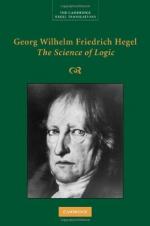|
This section contains 1,595 words (approx. 6 pages at 300 words per page) |

|
German philosopher Georg Wilhelm Friedrich Hegel (1770–1831), born in Stuttgart on August 27 and educated at the University of Tübingen, gained intellectual renown while teaching at the University of Berlin. A thoroughly systematic thinker, Hegel viewed philosophy, natural science, history, ethics, and religion as inherently connected in a whole that included difference while simultaneously transcending it. As a result, he presents the kind of comprehensive interpretation of science, technology, and ethics that is often implicit but seldom articulated in contemporary discussions, which, in light of Hegel, are challenged to move beyond particular case studies. Perhaps most famous for his Phenomenology of Spirit (1807), Hegel died suddenly on November 14 during a cholera epidemic.
 Georg Wilhelm Friedrich Hegel, 1770–1831. The German philosopher and educator took all of knowledge as his domain and made original contributions to the understanding of history, law, logic, art, religion, and philosophy. (The...
Georg Wilhelm Friedrich Hegel, 1770–1831. The German philosopher and educator took all of knowledge as his domain and made original contributions to the understanding of history, law, logic, art, religion, and philosophy. (The...|
This section contains 1,595 words (approx. 6 pages at 300 words per page) |

|


